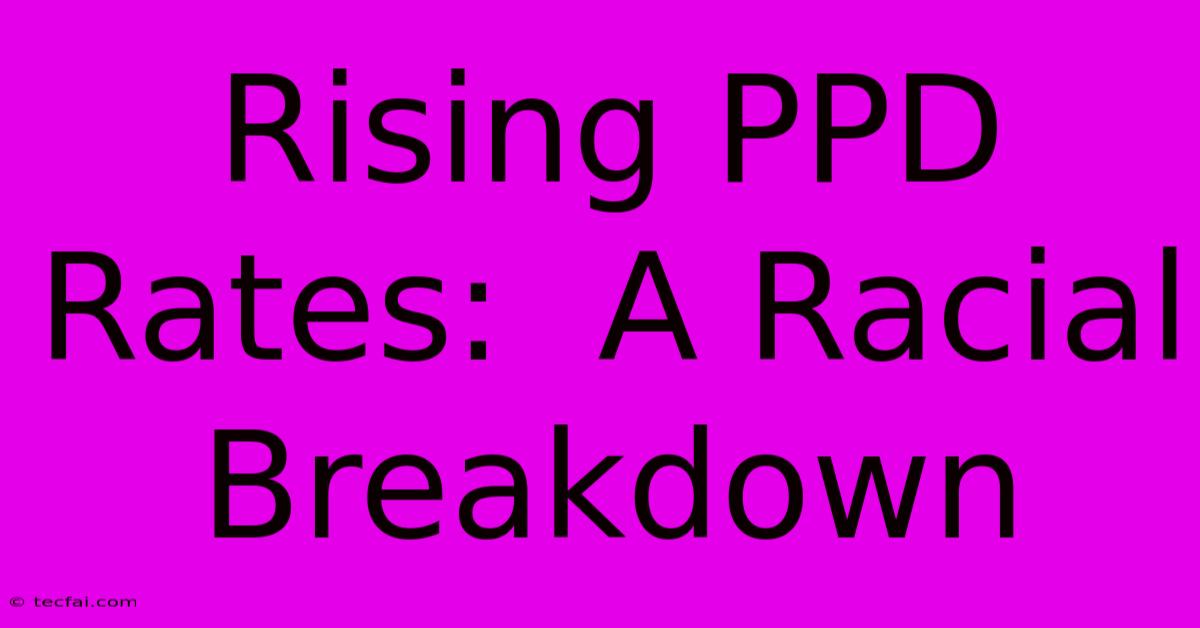Rising PPD Rates: A Racial Breakdown

Discover more detailed and exciting information on our website. Click the link below to start your adventure: Visit Best Website tecfai.com. Don't miss out!
Table of Contents
Rising PPD Rates: A Racial Breakdown
Postpartum depression (PPD) is a serious mental health condition affecting many new parents. While its prevalence is well-documented, a critical aspect often overlooked is the disparity in rates across racial groups. Understanding this racial breakdown is crucial for effective prevention, intervention, and ultimately, improved maternal health outcomes. This article explores the rising rates of PPD and examines the significant racial differences contributing to this concerning trend.
The Stark Reality of Disparities
Studies consistently reveal that women of color, particularly Black and Latina women, experience significantly higher rates of PPD compared to their white counterparts. This isn't simply a matter of statistical fluctuation; it points to a complex interplay of systemic factors deeply rooted in societal inequalities. While the exact reasons are multifaceted and require further research, several key contributing elements emerge:
Socioeconomic Factors and Access to Care
- Financial Instability: Financial hardship is a major stressor, and women from marginalized communities disproportionately face economic challenges. The added pressure of providing for a newborn intensifies pre-existing financial anxieties, significantly increasing the risk of PPD.
- Limited Access to Healthcare: Access to quality, affordable healthcare, including mental health services, is a significant barrier. Many women of color lack health insurance or face significant hurdles navigating the healthcare system, preventing timely diagnosis and treatment of PPD. This lack of access extends beyond healthcare itself; it includes access to adequate prenatal care and postpartum support.
- Healthcare Bias: Implicit bias within the healthcare system can lead to misdiagnosis or undertreatment of PPD in women of color. This can stem from assumptions about cultural differences, communication barriers, or even outright racism within healthcare settings.
Systemic Racism and its Impact
The impact of systemic racism cannot be understated. Generational trauma, ongoing discrimination, and microaggressions contribute to chronic stress, which increases vulnerability to mental health conditions like PPD. These factors create a cumulative burden that significantly impacts maternal well-being.
- Historical Trauma: The legacy of slavery and ongoing systemic racism has created a lasting impact on Black communities, contributing to higher levels of stress and mental health challenges.
- Environmental Factors: Exposure to environmental stressors such as unsafe neighborhoods, pollution, and lack of access to green spaces further exacerbates mental health risks.
Cultural Considerations and Support Systems
- Cultural Stigma: Stigma surrounding mental health is prevalent across many communities, but this stigma is often amplified in certain cultural contexts. This reluctance to seek help can significantly delay treatment and worsen symptoms.
- Limited Social Support: Strong social support networks are crucial for new mothers. However, systemic inequalities can disrupt the formation and maintenance of such networks, leaving many women feeling isolated and unsupported.
Addressing the Crisis: Moving Forward
Tackling the disproportionate rates of PPD in women of color requires a multi-pronged approach:
- Increased Funding for Research: Further research is essential to fully understand the complex interplay of factors contributing to these disparities.
- Improved Access to Healthcare: Expanding access to affordable, culturally competent healthcare, including mental health services, is paramount.
- Addressing Systemic Racism: Tackling systemic racism and inequality is crucial for creating a more equitable and supportive environment for all mothers.
- Community-Based Support Programs: Developing and expanding community-based programs that provide culturally sensitive support and resources are vital. This could include peer support groups and culturally relevant educational initiatives.
By acknowledging and addressing the racial disparities in PPD rates, we can work towards a future where all mothers have access to the support and resources they need to thrive during the postpartum period. This requires a collective effort from healthcare providers, policymakers, researchers, and the community at large. The well-being of mothers and their families depends on it.

Thank you for visiting our website wich cover about Rising PPD Rates: A Racial Breakdown. We hope the information provided has been useful to you. Feel free to contact us if you have any questions or need further assistance. See you next time and dont miss to bookmark.
Featured Posts
-
Winning Ffos Las Horse Racing Bets
Dec 03, 2024
-
Snowdens Wolverhampton Challenge
Dec 03, 2024
-
Maripier Morins Tlmep News
Dec 03, 2024
-
Trolley Problems Lingering Impact
Dec 03, 2024
-
Presyo Ng Lpg Tumaas Ng P1 20 Kg
Dec 03, 2024
